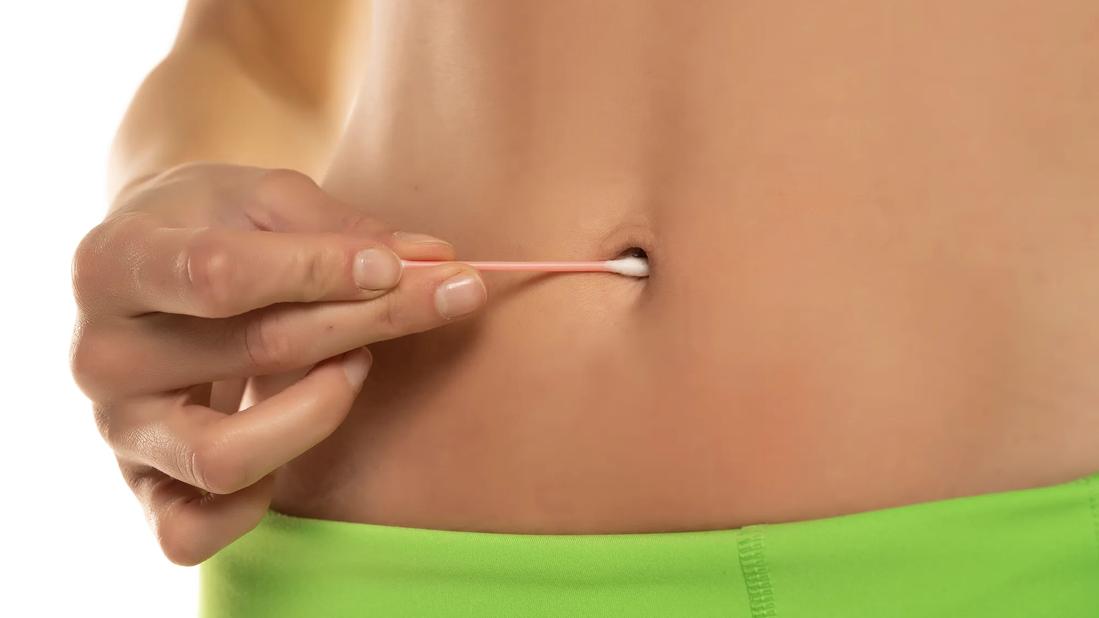Make sure you’re being gentle and using a fragrance-free, mild soap to clean your belly button

Image content: This image is available to view online.
View image online (https://assets.clevelandclinic.org/transform/fd4a1913-4b5f-4e5b-bf40-3b9e7ea49cc3/clean-bellybutton-swab-1434073511)
Person cleaning their belly button with a cotton swab
Most of us probably don’t pay much attention to our belly buttons beyond acknowledging their pre-birth function as the connector for our umbilical cord.
Advertisement
Cleveland Clinic is a non-profit academic medical center. Advertising on our site helps support our mission. We do not endorse non-Cleveland Clinic products or services. Policy
But your belly button contains bacteria just like every other part of your body, and that means it needs cleaning every now and then. Neglecting to clean your belly button can lead to unpleasant odors, irritation and infection.
To avoid these things from happening, internal medicine physician Manjaree Daw, MD, explains how you should clean your belly button at least once a week (if not more).
Belly buttons, regardless of their shape or size, are hot pockets for dirt, bacteria and other germs. When cleaning them, it’s important to be gentle, so as not to cause irritation to sensitive skin. It’s also important to use soap products that are fragrance-free and mild. That means staying away from scented body lotions.
“I wouldn’t use anything else but soap and water,” advises Dr. Daw. “Soapy water works every time.”
If you have an innie belly button (or concave navel), you know they’re dark, moist environments that can be the perfect breeding ground for bacteria.
“Since that area inside your belly button isn’t getting much air, bacteria tend to accumulate and proliferate inside the tiny folds of your skin,” explains Dr. Daw. “If dirt or dead skin cells sit in there and lose moisture, it can become a big, hard ball of debris, and it might feel rough when removing it.”
Advertisement
Avoid rigorously scrubbing the inside of your belly button. If you cause small tears in that sensitive skin, the bacteria can easily get inside and cause an infection. Instead, you should:
Outie belly buttons (or convex navels) look like little knots. As they’re easily accessible and are naturally exposed to open air, they’re easier to clean:
Fresh belly button piercings run the risk of infection because they cause a small opening in your skin where bacteria can get in. If your piercing is new, follow the cleaning instructions given to you and make sure you keep the area cleaned. Once your belly button piercing is fully healed, you can clean the area as you would without a piercing, with mild soap and a gentle touch.
If your belly button goes unclean for too long, you could run into these common issues:
“There’s no harm in cleaning your belly button daily, as long as you’re not traumatizing the area by scrubbing too hard or using harsh products that irritate your skin,” notes Dr. Daw.
“If your belly button is painful or you have discharge and you don’t know what’s going on down there, I would make an appointment to see your primary care provider.”
Advertisement

Sign up for our Health Essentials emails for expert guidance on nutrition, fitness, sleep, skin care and more.
Learn more about our editorial process.
Advertisement
The short answer from a gastroenterologist
It’s a great disinfectant for around your home, but not for your skin
Bathing once a day is the general guidance, but you could also have reasons to soap up twice a day or not at all
Abdominal exercises don’t have to be done on the floor!
You’re sharing your sheets with dust mites, bacteria and lots of dead skin, so you’ll want to keep your bedding fresh
You may notice itching, redness and swelling after wearing or using laundered items
Don’t ‘go with the flow’ if you have issues with urge incontinence or a contagious infection
We don’t fully understand how cleanliness impacts immune system development, but we do know that preventing illness is important
Although it could be used as a moisturizer, this new trend is not recommended
Communicating clear limits helps protect your time, energy and emotional well-being
High cholesterol can be genetic, but testing and treatment can lower your heart disease risk